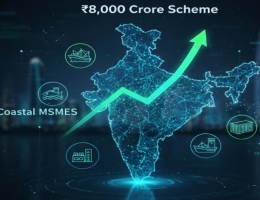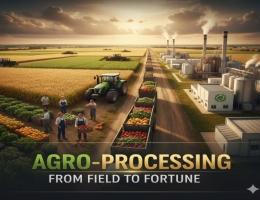
EV Is Booming! Old Networks, New Opportunities
Introduction: Why the EV Supply Chain Is Not Just for Big Corporations
India’s electric vehicle (EV) supply chain is fast emerging as a major industrial frontier where MSMEs can thrive, not just large corporations. As the nation accelerates toward reducing fossil-fuel dependence, promoting manufacturing localization, and achieving climate goals, opportunities across the EV value chain are multiplying. While large OEMs and battery manufacturers dominate headlines, crucial gaps remain in battery materials, thermal management systems, enclosures, charger hardware, and control electronics, segments where domestic production is still limited. Government policies such as FAME-II (fame2.heavyindustries.gov.in), PLI for Advanced Chemistry Cells (ACC) (heavyindustries.gov.in), and PM E-DRIVE (pib.gov.in) are establishing frameworks that offer incentives, tax benefits, and predictable demand, reducing risk for smaller enterprises. For MSMEs, this is not just a new trend but a generational opportunity to participate in India’s industrial transition toward clean mobility.
How Can MSMEs Enter the EV Supply Chain Business?
MSMEs seeking entry into the EV ecosystem must start by mapping their core strengths: fabrication, metalworking, plastics, electronics, or thermal systems and align them with opportunities in EV modules, charger components, safety testing equipment, and packaging or cooling systems. Through the FAME India Phase-II Scheme, the government has already incentivized over 16 lakh EVs and supported charging infrastructure across the country (fame2.heavyindustries.gov.in). The ACC battery storage PLI scheme, with an outlay of ₹18,100 crore, aims to create domestic capacity for advanced battery chemistries, opening doors for MSMEs to supply components, assemble battery packs, or design controllers and thermal modules (heavyindustries.gov.in). Financing remains a hurdle for many, but initiatives like Mission EVOLVE by SIDBI, in partnership with NITI Aayog and the World Bank, provide targeted funding support to MSMEs (sidbi.in). Skilling and training programs such as the Tamil Nadu EV Skilling Program by WRI India and FaMe TN further enable a qualified workforce for EV manufacturing. By combining technical adaptation with participation in government programs, MSMEs can offset entry costs and integrate themselves into the national EV value chain.
Challenges & Their Solutions
Despite the upside, MSMEs in the EV supply chain face serious headwinds and government sources help validate both the risks and remedies. First, raw material and component import dependence is deeply entrenched: India still lacks a robust upstream manufacturing base for cathodes, anodes, and specialty electrolytes, forcing reliance on imports. The PLI‑ACC scheme explicitly addresses this by incentivizing domestic cell and component manufacturing (heavyindustries.gov.in). Second, quality and safety testing requirements for cells, BMS, and packs (impact testing, thermal cycling, vibration, etc.) are mandatory to avail incentives under FAME-II / PLI, pushing MSMEs to either upgrade labs or partner with certified test houses (fame2.heavyindustries.gov.in). Third, financing and global cost competitiveness remain major constraints, smaller firms often lack the capital to scale or absorb price pressures from global players. To counter this, MSMEs should form clusters or consortiums to pool resources and share costs, leverage scheme support such as PLI (heavyindustries.gov.in), PLI-ACC (heavyindustries.gov.in), and FAME-II (fame2.heavyindustries.gov.in), adopt modular and lean manufacturing practices, and coordinate with state EV cells and industry associations to access local incentives and infrastructure support.
Path Ahead: Scaling, Innovation, and Integration
The future for MSMEs in the EV supply chain lies in moving beyond low-value manufacturing into innovation-driven segments such as advanced materials, thermal management, battery recycling, and digital integration through BMS and IoT diagnostics. MSMEs that innovate, maintain quality standards, and align with the nation’s evolving EV ecosystem will find themselves in high demand as suppliers and collaborators for both domestic and global markets. As India advances with FAME-III, PLI for Auto and Components, PM E-DRIVE, and state-level skilling and infrastructure programs, the policy and investment environment will remain strong. The combination of government backing, market demand, and technological transformation positions MSMEs at the heart of India’s EV revolution, turning what once seemed an opportunity for large corporations into a scalable, profitable frontier for small and medium enterprises ready to power the future of mobility.











